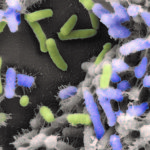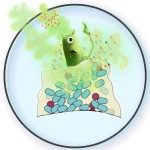Lien vers Pubmed [PMID] – 25725014
FEMS Microbiol. Rev. 2015 Mar;39(2):222-33
Bacterial interactions with neighboring microorganisms via production of small metabolites enable bacteria to respond and adapt to environmental changes. The study of intercellular interactions primarily focused on soluble metabolites, but bacteria also produce and release into their headspace a wide variety of volatile secondary metabolites, the ecological roles of which have generally been overlooked. However, bacterial volatile compounds are known to contribute to interkingdom interactions (plant, fungi and nematodes), and recent studies also identified their at-a-distance influence on bacterial behavior. The present review describes the biological roles of bacterial volatile compounds in inter- and intraspecies bacterial interactions, a new and yet unexplored research area, with potential clinical and industrial applications.


